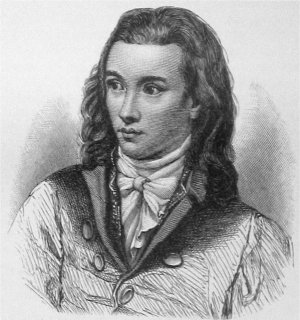Novalis nejznámější citáty
Novalis citáty a výroky

„Zlatý věk je tam, kde jsou děti.“
Varianta: Tam, kde jsou děti, je zlatý věk.
„Náboženství je opium lidstva.“
2. května 1772, zámek Oberwiederstedt – 25. března 1801, Weißenfels. Zdroje: Georg Büchmann - Geflügelte Worte, 6. vyd., Frankfurt 1991 Paul Johnson – Intellectuals, Londýn 1988 (především kapitola o Karlu Marxovi)
Novalis: Citáty anglicky
Novalis (1829)
Kontext: The true philosophical Act is annihilation of self (Selbsttodtung); this is the real beginning of all Philosophy; all requisites for being a Disciple of Philosophy point hither. This Act alone corresponds to all the conditions and characteristics of transcendental conduct.
Novalis (1829)
Kontext: Man consists in Truth. If he exposes Truth, he exposes himself. If he betrays Truth, he betrays himself. We speak not here of lies, but of acting against Conviction.
Fragment No. 2
Blüthenstaub (1798)
Kontext: Denotation by means of sounds and markings is a remarkable abstraction. Three letters designate God for me; several lines a million things. How easy becomes the manipulation of the universe here, how evident the concentration of the intellectual world! Language is the dynamics of the spiritual realm. One word of command moves armies; the word Liberty entire nations.
“Harmony is what his spirit strives to promulgate, to extend.”
Pupils at Sais (1799)
Kontext: The waking man looks without fear at this offspring of his lawless Imagination; for he knows that they are but vain Spectres of his weakness. He feels himself lord of the world: his me hovers victorious over the Abyss; and will through Eternities hover aloft above that endless Vicissitude. Harmony is what his spirit strives to promulgate, to extend. He will even to infinitude grow more and more harmonious with himself and with his Creation; and at every step behold the all-efficiency of a high moral Order in the Universe, and what is purest of his Me come forth into brighter and brighter clearness. This significance of the World is Reason; for her sake is the World here; and when it is grown to be the arena of a childlike, expanding Reason, it will one day become the divine Image of her Activity, the scene of a genuine Church. Till then let man honour Nature as the Emblem of his own Spirit; the Emblem ennobling itself, along with him, to unlimited degrees. Let him, therefore, who would arrive at knowledge of Nature, train his moral sense, let him act and conceive in accordance with the noble Essence of his Soul; and as if of herself Nature will become open to him. Moral Action is that great and only Experiment, in which all riddles of the most manifold appearances explain themselves. Whoso understands it, and in rigid sequence of Thought can lay it open, is forever master of Nature.
“The first Man is the first Spirit-seer; all appears to him as Spirit.”
Novalis (1829)
Kontext: The first Man is the first Spirit-seer; all appears to him as Spirit. What are children, but first men? The fresh gaze of the Child is richer in significance than the forecasting of the most indubitable Seer.
Pupils at Sais (1799)
Kontext: Not wise does it seem to attempt comprehending and understanding a Human World without full perfected Humanity. No talent must sleep; and if all are not alike active, all must be alert, and not oppressed and enervated. As we see a future Painter in the boy who fills every wall with sketches and variedly adds colour to figure; so we see a future Philosopher in him who restlessly traces and questions all natural things, pays heed to all, brings together whatever is remarkable, and rejoices when he has become master and possessor of a new phenomenon, of a new power and piece of knowledge.
“Love works magic.
It is the final purpose
Of the world story,
The Amen of the universe.”
Die Liebe wirkt magisch.
Sie ist der Endzweck
der Weltgeschichte,
das Amen des Universums.
Variant translations:
Love is the final end of the world's history, the Amen of the universe.
As translated by W. Hastie in Thoughts on Religion, Pt. 1, "Hymns and Thoughts on Religion" (1888), edited by W. Hastie
Love is the final purpose of world history — the Amen of the universe.
Love works magically...
Love causes magic...
Blüthenstaub (1798), Unsequenced
“We touch Heaven, when we lay our hand on a human body.”
Variant translation: There is but one temple in the Universe and that is the Body of Man.
As inscribed on the Library of Congress, quoted in Handbook of the New Library of Congress (1897) by Herbert Small, p. 53
Novalis (1829)
Kontext: There is but one Temple in the World; and that is the Body of Man. Nothing is holier than this high form. Bending before men is a reverence done to this Revelation in the Flesh. We touch Heaven, when we lay our hand on a human body.
Pupils at Sais (1799)
Kontext: No one, of a surety, wanders farther from the mark than he who fancies to himself that he already understands this marvellous Kingdom, and can, in few words, fathom its constitution, and everywhere find the right path. To no one, who has broken off, and made himself an Island, will insight rise of itself, nor even without toilsome effort. Only to children, or childlike men, who know not what they do, can this happen. Long, unwearied intercourse, free and wise Contemplation, attention to faint tokens and indications; an inward poet-life, practised senses, a simple and devout spirit: these are the essential requisites of a true Friend of Nature; without these no one can attain his wish.
“The world must be romanticized. In this way the originary meaning may be found again.”
As quoted in The Experience of the Foreign : Culture and Translation in Romantic Germany (1992) by Antoine Berman
Variant translation: Romanticize the world.
Pupils at Sais (1799)
Kontext: Common Logic is the Grammar of the higher Speech, that is, of Thought; it examines merely the relations of ideas to one another, the Mechanics of Thought, the pure Physiology of ideas. Now logical ideas stand related to one another, like words without thoughts. Logic occupies itself with the mere dead Body of the Science of Thinking. — Metaphysics, again, is the Dynamics of Thought; treats of the primary Powers of Thought; occupies itself with the mere Soul of the Science of Thinking. Metaphysical ideas stand related to one another, like thoughts without words. Men often wondered at the stubborn Incompletibility of these two Sciences; each followed its own business by itself; there was a want everywhere, nothing would suit rightly with either. From the very first, attempts were made to unite them, as everything about them indicated relationship; but every attempt failed; the one or the other Science still suffered in these attempts, and lost its essential character. We had to abide by metaphysical Logic, and logical Metaphysic, but neither of them was as it should be.
“I was still blind, but twinkling stars did dance
Throughout my being's limitless expanse”
As quoted in Romantic Vision, Ethical Context: Novalis and Artistic Autonomy (1987) by Géza von Molnár, p. 2
Kontext: I was still blind, but twinkling stars did dance
Throughout my being's limitless expanse,
Nothing had yet drawn close, only at distant stages
I found myself, a mere suggestion sensed in past and future ages.
Novalis (1829)
Kontext: When we speak of the aim and Art observable in Shakespeare's works, we must not forget that Art belongs to Nature; that it is, so to speak, self-viewing, self-imitating, self-fashioning Nature. The Art of a well-developed genius is far different from the Artfulness of the Understanding, of the merely reasoning mind. Shakspeare was no calculator, no learned thinker; he was a mighty, many-gifted soul, whose feelings and works, like products of Nature, bear the stamp of the same spirit; and in which the last and deepest of observers will still find new harmonies with the infinite structure of the Universe; concurrences with later ideas, affinities with the higher powers and senses of man. They are emblematic, have many meanings, are simple and inexhaustible, like products of Nature; and nothing more unsuitable could be said of them than that they are works of Art, in that narrow mechanical acceptation of the word.
“Life must not be a novel that is given to us, but one that is made by us.”
Zdroj: Novalis: Philosophical Writings
As quoted in "Bildung in Early German Romanticism" by Frederick C. Beiser, in Philosophers on Education : Historical Perspectives (1998) by Amélie Rorty, p. 294
“We are close to waking when we dream that we are dreaming.”
Variants:
Novalis (1829)
Varianta: We are near awakening when we dream that we dream.
Zdroj: Novalis: Philosophical Writings
“The artist stands on the human being as a statue does on a pedestal.”
Zdroj: Novalis: Philosophical Writings
“Philosophy is properly Home-sickness; the wish to be everywhere at home.”
Philosophie ist eigentlich Heimweh - Trieb überall zu Hause zu sein.
Novalis (1829)
Varianta: Philosophy is really nostalgia, the desire to be at home.
Zdroj: Novalis: Philosophical Writings
Fragment No. 104; on Edmund Burke's Reflections on the Revolution in France (1790).
Blüthenstaub (1798)
As quoted in the Fourth Leaflet of the White Rose (1942)
“To get to know a truth properly, one must polemicize it.”
Quoted in The Viking Book of Aphorisms by Wystan Hugh Auden (1962) p. 323

